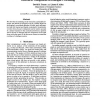Free Online Productivity Tools
i2Speak
i2Symbol
i2OCR
iTex2Img
iWeb2Print
iWeb2Shot
i2Type
iPdf2Split
iPdf2Merge
i2Bopomofo
i2Arabic
i2Style
i2Image
i2PDF
iLatex2Rtf
Sci2ools
117
click to vote
ACL
1994
1994
Discourse Obligations in Dialogue Processing
We show that in modeling social interaction, particularly dialogue, the attitude of obligation can be a useful adjunct to the popularly considered attitudes of belief, goal, and intention and their mutual and shared counterparts. In particular, we show how discourse obligations can be used to account in a natural manner for the connection between a question and its answer in dialogue and how obligations can be used along with other parts of the discourse context to extend the coverage of a dialogue system. 1 Motivation Most computational models of discourse are based primarily on an analysis of the intentions of the speakers (e.g., [Cohen and Perrault, 1979; Allen and Perrault, 1980; Grosz and Sidner, 1986]). An agent has certain goals, and communication results from a planning process to achieve these goals. The speaker will form intentions based on the goals and then act on these intentions, producing utterances. The hearer will then reconstruct a model of the speaker's intenti...
ACL 1994 | ACL 2007 | Agent B | Agent B Goals | Discourse |
Related Content
| Added | 02 Nov 2010 |
| Updated | 02 Nov 2010 |
| Type | Conference |
| Year | 1994 |
| Where | ACL |
| Authors | David R. Traum, James F. Allen |
Comments (0)

